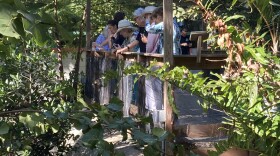-
Cape Coral Friends of Wildlife will host the 24th Annual Burrowing Owl Festival on Feb. 28, bringing conservation groups, tours and family activities to Rotary Park.
-
Cape Coral Friends of Wildlife will host a Southwest Florida Birding Specialty Tour on Saturday, Feb. 28 as part of the 24th Annual Burrowing Owl Festival. The four-hour guided tour runs from 7 to 11 a.m., with participants asked to arrive by 6:45 a.m. at Rotary Park, 5505 Rose Garden Road.The tour will travel by bus to multiple birding locations in Cape Coral and surrounding areas, with short walks expected at select stops. Organizers say participants may see burrowing owls and other bird species common to Southwest Florida, including bald eagles, herons and egrets.Tickets cost $70 and include admission to the Burrowing Owl Festival. Advance purchase is required through ccfriendsofwildlife.org. The festival’s Wildlife and Environmental Expo will also take place Feb. 28 from 10 a.m. to 4 p.m. at Rotary Park, featuring tours, vendors, speakers and family activities.
-
Mullock Creek Preserve in Lee County and surrounding areas were submerged in more than 8 feet of water during Hurricane Ian. To address this, the Federal Emergency Management Agency (FEMA) updated the emergency flood maps for residents and property owners surrounding the preserve, nearly four years after Ian’s landfall. But there’s a common misconception regarding these maps and why they are revised—one Donald Duke, Ph.D., a Florida Gulf Coast University professor in the Department of Ecology and Environmental Studies, said property owners in all areas need to remain privy to.
-
Nearly 49,000 people took to the streets Tuesday afternoon to take part in more than 1,200 events across the U.S. Locally, the Free America Walkout, orchestrated by WomensMarch.com, brought nearly 40 people, waving signs, flags, and banners, to the I-75 Estero Overpass Bridge. Countless drivers in a variety of vehicles passed under on I-75, many honking horns as the demonstrators protested the Trump Administration's immigration policies, the conduct of Immigration and Customs Enforcement (ICE) agents, and what the organizer contended is a slippery slope toward fascism.
-
This month a Southwest Florida icon is celebrating its 90th birthday. And it's doing so with its eye on what it hopes will be a bright and bold future. The Everglades Wonder Gardens opened in 1936, and still is a big visitor draw today.
-
City of Naples voters will have eight candidates to choose from in the February 3, 2026, election. Three city council seats are at stake in the election.
-
Our Mothers Home is celebrating 25 years in Southwest Florida. Its goal: to help pregnant teenagers and teen mothers and their children.
-
Lee County now has a new commissioner. Thirty-four-year-old Patricia 'Trish' Petrosky was sworn in Monday on the steps of the Old Lee Courthouse in Fort Myers.
-
Lee County is having to delay the in-person issuing of parking permits on Boca Grande. Lee had scheduled a number of days in December for people to get permits at a location in the community. But Lee said Friday that building construction is causing utility problems at the permit distribution site.
-
After years of hiatus, Jennifer Rena Bennett, owner of Matlacha's Island Flair, has partnered with the Matlacha Civic Association to resurrect Matlacha's Art Walk. Its resurgence returned to the small island on June 13, 2025. Since then, the event has gained increased attention with an intrinsic goal of rejuvenating and reinvigorating the quaint business community, home to the historic fishing village, during the times of stability prior to the cavalcade of hurricanes Ian, Helene and Milton—all of which impacted the low-lying island in different ways.
Play Live Radio
Next Up:
0:00
0:00
Available On Air Stations










